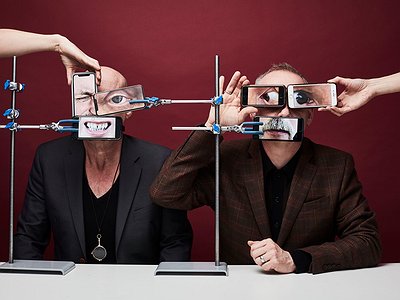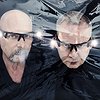Part 1
Name: Orbital
Members: Paul and Phil Hartnoll
Interviewee: Paul Hartnoll
Nationality: British
Occupation: Producers
Current Release: Monsters Exist / Pre-Order Here
Current Tourdates: 20.10.18 / Cologne – Bürgerhaus Stollwerck // 21.10.18 / Hamburg – Uebel & Gefährlich // 23.10.18 / Berlin – Festsaal Kreuzberg
Recommendations: The Terry Gilliam film ‘Brazil’ (it made me give up my job and go to art collage).
The Never-Ending Days Of Being Dead - a book by Marcu Chown, Dispatches From The Front Line Of Science. It’s stranger than fiction.
Website / Contact: If you enjoyed this interview with Orbital, visit their website, which is densely packed with sounds, songs and information.
When did you start writing/producing music - and what or who were your early passions and influences? What what is about music and/or sound that drew you to it?
I first realised I wanted to do music when I heard the 2 Tone bands at age 12. I’ve never looked back. From there I got into punk, my favourite bands were Crass and the Dead Kennedys. I always liked electronic music as well. I remember seeing Gary Numan perform ‘Are Friends Electric?’ on Top Of The Pops and it spoke to me as something I wanted to do.
For most artists, originality is first preceded by a phase of learning and, often, emulating others. What was this like for you? How would you describe your own development as an artist and the transition towards your own voice? What is the the relationship between copying, learning and your own creativity?
I think originality is trying to copy your influences and getting it wrong. I have tried to copy so many people in my time: Severed Heads, Kraftwerk, Cabernet Voltaire, Depeche Mode, On-U Sound Records, US electro from the 80s, Front 242. The list is endless. I get it wrong all the time, that’s the secret of my success! Seriously though, I wonder how much of this people hear in my music.
There are two points for me I think. One is that I was making electronic music already when I first heard house music. I simultaneously wanted to to have a go at making it, but I also saw a gap in it, I felt it wasn't industrial / psychedelic / political enough so I had a go at doing it how I wanted to hear it. So straight away you get a situation where you are both copying and creating something new at the same time.
I think for some as younger artists there is a tendency to run with the pack and ride a wave of similar creative minds, bouncing ideas off of each other, which is great fun and has a sense of belonging when you need it during your formative years. I think in your creative middle age, once you’re established as an artist and there is a sense of expectation either from fans or the ego of the artist, it’s easy to get caught up in worrying about what other people think / want. This usually ends up with less interesting creative output as it’s not really what anyone wants. Nowadays I’m very comfortable with what I do, I just do what I like! As I’ve grown older I’ve found creativity gets loose again as you realise you must do what you want, it is after all what people liked about your art in the first place. Being an artist is all about discovery, the more you learn and the more you create - it just opens up other doors you didn’t see before, it is a real journey that, I’m sure, will never end.
I think you realise there are two things to composition and producing music, there’s the style and then there’s your voice. Musicians change style all the time, that’s the bit we borrow and copy and change like clothes, it’s not that important really, but people get caught up in it. It’s your voice, your compositional style, that really resonates with people. That’s the part they gel with, not the style. It’s that voice that is the real journey, the slow development of that part of the artist.
What were your main compositional-and production-challenges in the beginning and how have they changed over time?
It was simpler in the beginning, which was great for me at the time. I had a few synths and a drum machine, a limited sampler and a four-track tape machine. A song was finished as soon as I ran out of synths or tracks! Now I have a ridiculous collection of synths and an endless amount of tracks on my laptop for recording. Luckily, I’m more disciplined and know what I want nowadays. It must be hard being disciplined when starting out now with the endless possibilities of the laptop computer and software.
What was your first studio like? How and for what reasons has your set-up evolved over the years and what are currently some of the most important pieces of gear for you?
First studio, the one I made ‘Chime’ on, was under the stairs at my parent’s house and consisted of:
Yamaha four-track tape machine
A bad 6 channel PA system
909 drum-machine
303 synth
Akai s700 sampler
Sh-09 synth
DX 100
Poly 800 synth
Boss delay pedal
[Read our feature on the Roland TR-909]
[Read our feature on the Roland TB-303]
It just got bigger and bigger as time went on with the desire for more tracks to record onto, we went for a 16-channel mixing desk and a bigger sampler next.
Now it’s all about the laptop and Ableton as the brain, and a room full of old and new synths and samplers. Very little outboard gear as I tend to mix in the box.
Some favourite synths are the Macbeth m5n, Roland system 100m elektron analogue rytm and the faithful 909 and Jupiter 6. I’ve had the last two for nearly 30 years. But to be honest synths go in and out of favour with me all the time. If you ask next month it would be a different answer!
How do you make use of technology? In terms of the feedback mechanism between technology and creativity, what do humans excel at, what do machines excel at?
We get tired, they don’t. I tend to use technology for my ends. Certain machines have certain constraints and strengths, but as I have a great selection, there’s always something that will do exactly what I want. I tend to have a compositional idea and then instinctively go to the machine that will best do the work.
I guess in terms of feedback, the more you know the machines and their abilities and the more you know what you want, the two can feed off each other. You may think of something based on what a favourite machine can do. Or you may be exploring a certain machine and find something new which sparks an idea, so it can work both ways.
Production tools, from instruments to complex software environments, contribute to the compositional process. How does this manifest itself in your work? Can you describe the co-authorship between yourself and your tools?
All instruments have a sound whether a voice, guitar, a modular synth or a piece of software. All have limits and constraints. I think that’s where the fun is. Being constrained by the limits of your skill or the machine, but getting creative within those boundaries anyway. I can only experience my life, so I’m already constrained in my inspiration, team me up with an instrument with limitations and something interesting happens. I guess that’s what makes each artist unique. Limitation + creativity = unique art. There is no co-authorship between me and my tools, that’s all they are, tools.
I think it was Ray Charles that said:
"It ain’t the instrument baby!” very true.






